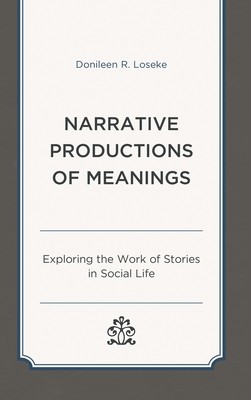
- We will send in 10–14 business days.
- Author: Donileen R Loseke
- Publisher: Lexington Books
- ISBN-10: 1498577792
- ISBN-13: 9781498577793
- Format: 15.2 x 22.9 x 0.8 cm, softcover
- Language: English
- SAVE -10% with code: EXTRA
Reviews
Description
In Narrative Productions of Meanings: Exploring the Work of Stories in Social Life, Donileen R. Loseke examines the importance of stories in an anti-science, anti-fact era where a multitude of personal, social, and political problems surround meaning. This book's basic argument is that, within such a world, narrative productions of meaning are particularly important because stories can appeal simultaneously to thinking, feeling, and moral evaluation, and because they can do this in ways that have cultural, interactional, and personal dimensions. This book develops a framework for social science examinations of narrative; it outlines relationships between stories, storytelling, and culture; and it explores the characteristics of several types of stories including self stories, stories that persuade mass audiences that public resources are required to resolve intolerable conditions, and stories that justify the contents of public policy. It concludes with relationships between stories and democratic politics. In multiple ways, this analysis crosses common divides: It draws from literature spanning multiple disciplines; it treats thinking, feeling, and moral evaluation as inseparable; it bridges cultural and social psychological perspectives; and it demonstrates relationships between story structure and the work people do with stories
EXTRA 10 % discount with code: EXTRA
The promotion ends in 17d.06:56:35
The discount code is valid when purchasing from 10 €. Discounts do not stack.
- Author: Donileen R Loseke
- Publisher: Lexington Books
- ISBN-10: 1498577792
- ISBN-13: 9781498577793
- Format: 15.2 x 22.9 x 0.8 cm, softcover
- Language: English English
In Narrative Productions of Meanings: Exploring the Work of Stories in Social Life, Donileen R. Loseke examines the importance of stories in an anti-science, anti-fact era where a multitude of personal, social, and political problems surround meaning. This book's basic argument is that, within such a world, narrative productions of meaning are particularly important because stories can appeal simultaneously to thinking, feeling, and moral evaluation, and because they can do this in ways that have cultural, interactional, and personal dimensions. This book develops a framework for social science examinations of narrative; it outlines relationships between stories, storytelling, and culture; and it explores the characteristics of several types of stories including self stories, stories that persuade mass audiences that public resources are required to resolve intolerable conditions, and stories that justify the contents of public policy. It concludes with relationships between stories and democratic politics. In multiple ways, this analysis crosses common divides: It draws from literature spanning multiple disciplines; it treats thinking, feeling, and moral evaluation as inseparable; it bridges cultural and social psychological perspectives; and it demonstrates relationships between story structure and the work people do with stories


Reviews